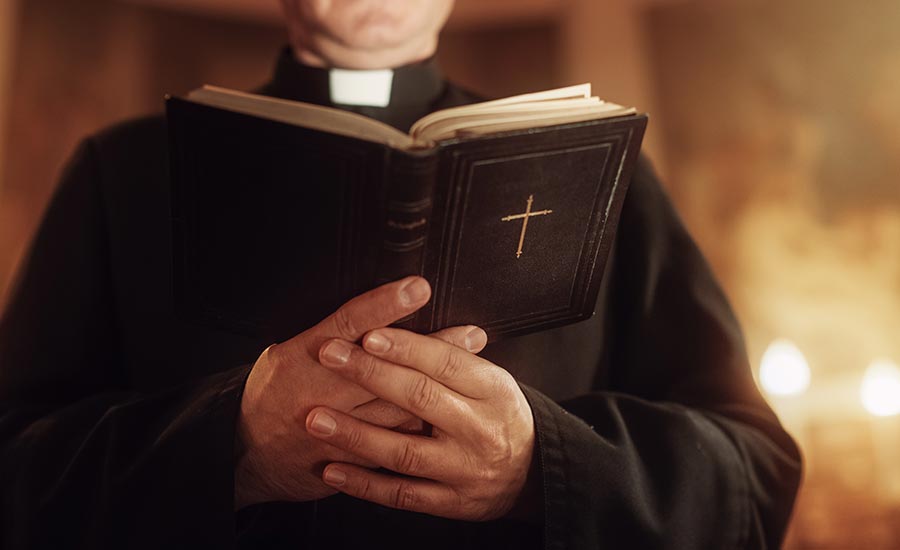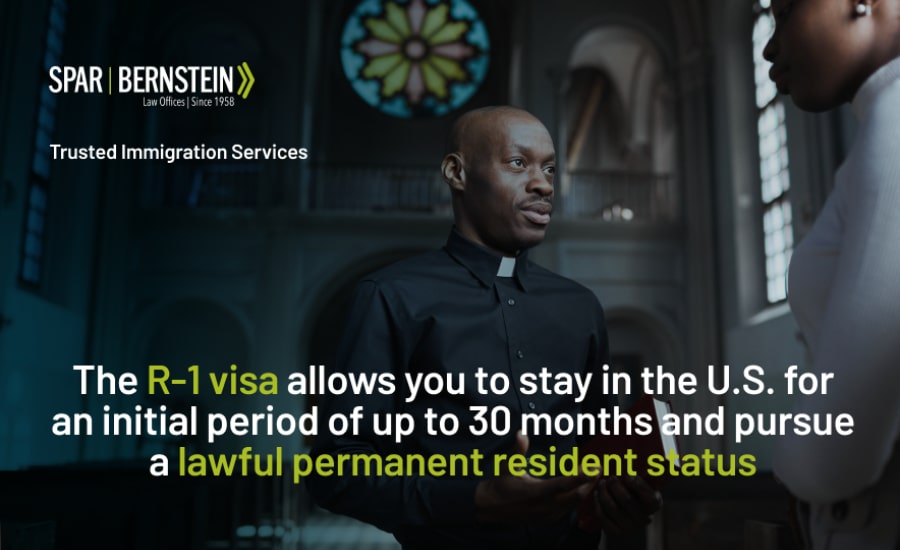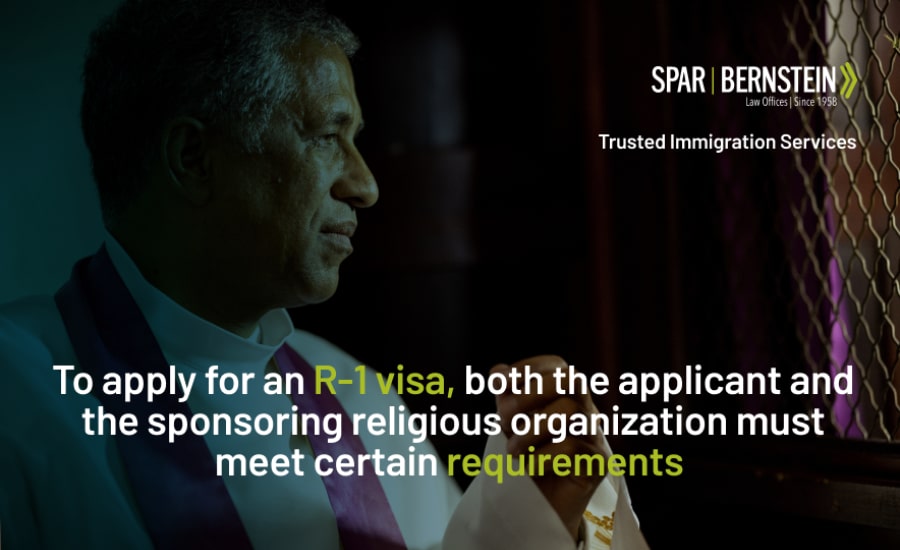

R-1 Visa: Key Takeaways
- The R-1 visa allows foreign religious workers to enter the United States temporarily to perform religious duties for a qualified religious organization
- Applicants must be ministers or religious workers who have been related to a U.S. nonprofit religious organization for at least two years and intending to work for at least 20 hours per week
- The R-1 visa allows staying in the U.S. up to 30 months, with possible extension to 60 months
- Both applicant and religious organization must meet eligibility criteria to start the process
Coming from diverse corners of the globe, R-1 visa holders provide support to vulnerable population groups, offer spiritual guidance in times of crisis, and help people keep their faith.
If you are a religious worker looking for employment in the U.S., an R-1 visa might allow you to travel to and work in the country.
We’ll explain:
- The essence of the R-1 visa
- The requirements needed to obtain an R-1 visa
- The steps to take to secure the visa
R-1 Visa Explained
An R-1 visa is a nonimmigrant visa issued by the U.S. to foreign religious workers seeking to enter the country temporarily to perform religious work.
To apply for an R-1 visa, you must receive a formal job offer from a religious organization or institution.
An R-1 visa generally allows you to:
- Stay in the U.S. for an initial period of up to 30 months.
- Extend your visa for an additional 30 months, for a total of five years.
- Travel in and out of the U.S. during the visa validity period, provided you maintain your status.
- Pursue permanent residency (Green Card) if you meet the eligibility criteria.
As a religious visa holder, your spouse and unmarried children under the age of 21 are eligible for R-2 visas.
These visas allow them to accompany you to the U.S. However, their status of derivative applicants does not authorize them to work in the country.
Unlike other nonimmigrant visa categories, there is no specific annual quota for R-1 visas.

Who Can Apply For An R-1 Visa?
You can apply for an R-1 visa if you fall into one of the two main groups: religious ministers or religious workers.
- Religious ministers: Religious ministers are authorized or recognized by their religious denomination to conduct religious worship and carry out other clergy-related duties. Their role is typically associated with religious congregations and spiritual guidance.
- Religious workers: Religious workers are employed in various religious vocations or occupations within a religious denomination. This group can include additional subgroups:
- Religious missionaries: Members of a religious denomination sent to the U.S. to perform missionary work, like spreading religious teachings and engaging in outreach programs.
- Religious healthcare workers: Doctors, nurses, and other medical professionals who are employed by religious-affiliated healthcare facilities and hospitals.
- Religious musicians and choir directors: Musicians, performers, and choir directors who are engaged in religious music programs and activities within a religious organization.
- Religious seminarians: People who are studying for the priesthood or ministry within their religious denomination and are willing to pursue theological education and practical training in the U.S.
- Religious brothers and sisters: Members of a religious order or community who engage in religious duties, such as education or community service, in line with the principles and teachings of their faith.
Keep in mind that the R-1 visa is reserved for paid religious workers. If you’re volunteering or not receiving compensation, you likely won’t qualify for it.
You may also be ineligible for an R-1 visa if you:
- Have previously violated U.S. immigration laws.
- Have overstayed your visa.
- Have certain criminal convictions or a serious criminal background.
R-1 Visa Requirements
The requirements for obtaining an R-1 visa include eligibility criteria for:
- The R-1 visa applicant
- The religious organization extending the job offer
R-1 Visa Requirements For Applicants
You’ll need to meet a few key requirements to qualify for the R-1 visa:
- Work solely in a religious occupation or vocation in the U.S.
- Work for a minimum of 20 hours per week based on a job offer specifying your role, responsibilities, and compensation.
- Hold at least a two-year membership in a religious denomination that has a bona fide, non-profit religious organization in the U.S. (this requirement is not valid for religious missionaries).
R-1 Visa Requirements For Religious Organizations
The organization sponsoring your R-1 visa must be one of the following:
- A U.S.-based religious organization, such as a church, mosque, or temple.
- A non-profit organization related to a religious denomination in the U.S.
- A religious organization approved for group tax exemption by a group tax exemption holder.
In addition, the religious organization must provide evidence that they will:
- Support you financially as an R-1 visa holder during your stay in the U.S., providing a reasonable salary or stipend.
- Pay you the prevailing wage for the specific religious occupation or vocation in the geographic area where you will be performing your religious duties.

R-1 Visa: Cost
The cost of an R-1 visa is distributed between the R-1 visa applicant and the sponsoring religious organization or institution.
- The filing fee for Form I-129, Petition for a Nonimmigrant Worker is paid by the sponsoring organization and is currently $510.
- The visa application fee is paid by the R-1 applicant and is $205.
How To Apply For An R-1 Visa
Applying for an R-1 visa includes several steps that need to be taken by both you and your sponsor.
1. The Religious Organization Files A Petition
Ask the sponsoring religious organization to file Form I-129 with the U.S. Citizenship and Immigration Services (USCIS).
The application serves as an official request to define the religious worker as an R-1 visa beneficiary.
Once USCIS approves the petition, they will send Form I-797, Notice of Action to the religious organization, confirming you can start the application process.
2. The Applicant Files Form DS-160
Once USCIS approves the petition, you’ll need to complete Form DS-160, Online Nonimmigrant Visa Application online.
Pay the fees and submit any required documents to support your case.
3. The Applicant Attends A Visa Interview
It’s now time to prepare for your visa interview.
Don’t forget your DS-160 confirmation page, passport, and approval notice.
4. Decision Is Received
Depending on your nationality and background, there may be additional security clearance procedures, which can add time to the processing of your visa application.
If your application is approved, the consular officer will place an R-1 visa in your passport.
5. Travel To The US
Upon arrival in the United States, present your R-1 visa to the Customs and Border Protection (CBP) officer at the port of entry.
The CBP officer will inspect your documents and determine if you are eligible to enter the country.
6. Extend Your Visa
If your work requires you to extend your stay in the U.S. beyond the initially approved period, ask your sponsoring organization to file an extension petition with USCIS before your visa expires.
Start The R-1 Visa Process With Spar & Bernstein
Handling cases in all spheres of immigration law, from business immigration to citizenship and naturalization, our experienced and compassionate attorneys at Spar & Bernstein have helped thousands of people pursue their dream to live and work in the U.S.
If you want to embark on a spiritual journey to the U.S. and you need an R-1 visa, our knowledgeable team will:
- Provide an initial consultation to discuss eligibility and visa requirements.
- Prepare, review, and submit required documentation and supporting evidence.
- Help you prepare for your R-1 visa interview.
- Address any Request for Evidence (RFE) USCIS sends out for more information.
- Provide updates on your R-1 visa petition.
- Help you explore various options for transitioning to a permanent residency (Green Card) status, if you decide to stay in the U.S.
Providing both legal support and a personalized approach, our attorneys at Spar & Bernstein will guide you through the complex R-1 visa application process to help you achieve your goals.
R-1 Visa: FAQs
Can I work another job while in the U.S. on an R-1 visa?
No, the R-1 visa allows you to work only in the specific religious role and for the organization that petitioned you.
What if I change religious employers while in the U.S.?
If you intend to change your employer, the new religious organization must file a new Form I-129 before you start working for them. You cannot typically transfer your R-1 visa without USCIS approval.
Can my spouse and children work in the U.S. if they accompany me on R-2 visas?
No, R-2 visa holders can only live and study in the U.S. Their immigration status does not provide them with work authorization.


